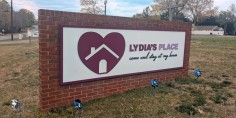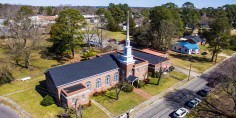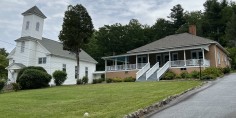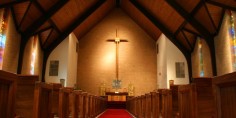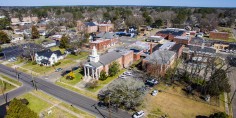United Methodist churches across North Carolina are working with their conferences to reimagine and repurpose existing church spaces for community ministry.
While the notion of repurposing space may conjure up images of expensive renovations, many adaptive reuse projects can be relatively simple. For active congregations, it can be as straightforward as launching a new program to serve the community in an existing, underused space. Where congregations have merged or disbanded, former church buildings can become homes to new ministries that often require minimal investment.
Joyful-Connections for Respite Care
In Kannapolis, five churches are working to create a new community program to provide respite for those caring for loved ones with dementia or memory loss. The idea emerged after five United Methodist churches that comprise the Kannapolis Missional Network requested an assessment from Wesley Community Development (Wesley CDC), a nonprofit real estate development firm which serves the two United Methodist conferences in North Carolina.
“We learned that most of our church properties were being used less than 2 percent of the time,” said Rev. Laurie Knoespel, pastor of Jackson Park UMC. Through conversations with Joel Gilland, president and CEO of Wesley CDC, church leaders explored options for pursuing their ministries while also generating revenue.
“All of the churches recognized the need to care for community members with memory loss. Almost everyone knows someone who is affected, either as someone in need of help or as a caregiver,” said Rev. Knoespel.
According to the Alzheimer’s Association, more than 210,000 people in North Carolina have some form of Alzheimer’s dementia. More than 381,000 people provide 739 million hours of unpaid care for their family or close friends.[1] (These numbers do not include those with other forms of dementia, such as Lewy Body Disease or vascular dementia).
Wesley CDC introduced the group to a program called Respite for All, a nationally recognized faith-based model of care designed with churches in mind. Based on a social, rather than medical model of care, Respite for All leverages the services of trained volunteers to deliver four hours of programming per day that focuses on creating an overall sense of well-being for participants and their caregivers.
Gilland helped the churches identify an unused space at Bethpage UMC that needed no upfitting to accommodate the program, and Daphne Johnston, co-founder and executive director at Respite for All, provided technical assistance and advice to get it started. The Kannapolis Missional Network named its program Joyful-Connections.
Joyful-Connections intentionally started small in May 2025, as a once-a-week program with three prospective participants and about a dozen volunteers. A $50/day per-person program fee covers the cost of lunch and supplies. A grant from the Respite for All Foundation provided start-up funding, and a part-time director oversees program operations and markets the program to member churches and the broader community. Ultimately, Joyful-Connections can serve up to 24 people per day at full capacity.
“There is great benefit when the church is taking care of members who have been engaged their whole lives, as well as the broader community,” said Rev. Knoespel. “It shows that the church truly cares.”
Community Counseling and Connection
In Cramerton, North Carolina, a former church education building is becoming a community hub. Rev. Laura Auten was appointed by the Western North Carolina Conference of the United Methodist Church as a half-time pastor in the community when Cramer Memorial UMC closed. “With the closing, there were some mixed messages in the community, and we wanted to maintain a dependable presence,” she said.
Instead of working within a church sanctuary, Rev. Auten is creating a different kind of sanctuary for community members within the former education building. Renamed Southfork Commons, the two-story building is now home to six mental health counselors on the top floor, who pay below-market rental rates to the WNC Conference.
“Three counselors were already using the space when I got here, so it was logical to expand that model,” Rev. Auten said.
A local nonprofit uses the building’s basement for much-needed storage. The main floor is home to a for-profit marketing firm as well as the former fellowship hall, in which Rev. Auten has experimented with different ways to engage the community.
A weekly open studio welcomes parents and grandparents to explore a wide variety of free art activities with their children and grandchildren. At other times, the space is used for group therapy.
When Auten first arrived, only a few rooms in the building were being regularly used. Now, only one remains unused. The six counselors see approximately 100 patients per week, Monday through Saturday, and the art studio welcomes an average of 18 to 20 people in its weekly sessions. “The network is definitely building,” said Auten.
“I was given the freedom to experiment with new forms of ministry within the community,” Rev. Auten explained, noting that the work was supported with a New Emerging Communities grant from the WNC UMC Conference, funded by The Duke Endowment in 2023. “I envision a more robust space for mental health and wellness that other churches and community agencies can access. Our location is walking distance to the river and park in downtown Cramerton, so I would love to see some outdoor spaces that create a sense of wholeness and wellness.”
Having served as pastor of Cramer Memorial 28 years ago, Rev. Auten sees a strong tie between the building as it was, and as it will be. “I know the families, what they gave, and what’s been important to them,” she said. “The congregation no longer exists, but what’s happening honors the community-mindedness they had.”
Gilland at Wesley CDC is excited by the new life and tremendous potential that even simple projects bring to church buildings. “The reuse of church properties in Cramerton, Kannapolis and other locations throughout North Carolina illustrates how churches of all sizes can increase relevance and grow their communities at relatively little cost,” he said. “As church leaders and congregations turn their imaginations on underused spaces, what is minimal in terms of money can provide maximum impact for ministry, which is the most important thing.”

